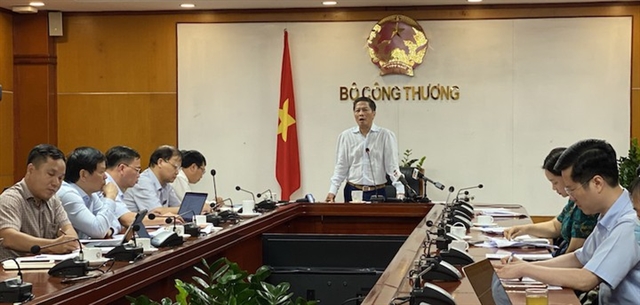 Economy
Economy

The Ministry of Industry and Trade (MoIT) has decided to cancel plans for a single price model to calculate power tariffs after receiving feedback from relevant ministries and experts.

|
| Minister of Industry and Trade Trần Tuấn Anh chaired the meeting on power tariff. The ministry decided to remove the single price model to calculate power tariff. — Photo courtesy of the ministry |
HÀ NỘI — The Ministry of Industry and Trade (MoIT) has decided to cancel plans for a single price model to calculate power tariffs after receiving feedback from relevant ministries and experts.
Nguyễn Anh Tuấn, director of MoIT’s Electricity Regulatory Authority of Việt Nam told a conference on Tuesday that a single price calculation, in addition to the current six-tiered pricing mechanism, would offer more options for customers. However, it would not encourage electricity-saving, which is a major policy of the Government.
The ministry is collecting opinions on a new calculation for power prices and will submit it to the Government for approval in August.
Under the proposed new rules, households would have been able to choose either a common price or the current tiered pricing mechanism. The single price would have been 145-155 per cent higher than the average power retail price or VNĐ2,703 to VNĐ2,890 per kWh.
However, the current six tiers would have been reduced to five to ensure households with a power consumption of less than 700 kWh (98.2 per cent of the total) would not face increased power bills.
Hoàng Tiến Dũng, director of MoIT’s Electricity and Renewable Energy Authority (EREA), also agreed to remove the single price plan.
He calculated that only 2 per cent of households consuming electricity could choose the mechanism as the more power people use, the more benefits they will get. However, households who use a lot of electricity are usually high-income, which would discourage electricity saving.
According to the ministry, with the single price plan, about 18.7 million customers using electricity less than 200 kWh, accounting for approximately 75 per cent of the total number of customers, would have to pay an extra VNĐ19,000 - 39,000.
The one price scheme had not been received consensus from economists and energy experts. Many experts believed the basis for the ministry to offer the tariff at the rate of 145-155 per cent of the average retail price was unclear. In addition, only households with high electricity usage of more than 700 kWh would benefit when choosing the one price option.
“The Ministry of Industry and Trade proactively researched and proposed a single price plan for power tariffs to try to meet the objectives of openness, transparency, easy calculation and reliability. However, after considering, calculating and receiving comments, this plan was not really suitable. There was no feasible implementation condition in the future,” said Minister Trần Tuấn Anh.
Anh said the single price mechanism would violate the principles of building electricity retail tariffs to ensure energy saving.
This option could be implemented, but it requires additional tools to support the poor.
“The one price electricity mechanism is meaningful if it does not have a strong impact on the vulnerable and the poor people in society. Therefore, if implementing the option, it would be very complicated," he said.
The minister said with the current situation, there is no plan better than the current tiered pricing mechanism. But each price tier should be studied to ensure efficiency and the benefits of the State, enterprises and people.
He asked the ERAV to re-verify the calculated figures of the step pricing mechanism.
After withdrawing the one electricity price option, the ministry will continue to collect comments on the five-tiered pricing mechanism to submit to the Prime Minister for consideration in the third quarter.
The tiered pricing model sets the tier 1 price at 90 per cent of the average price per unit, which is VNĐ1,864.44 ($0.08) for 1 kWh, tier 2 at 108 per cent, tier 3 at 141 per cent, tier 4 at 160 per cent and tier 5 at 274 per cent.
Previously, electricity prices stirred public opinion when in hot and sunny months, electricity bills of many households soared and many say the six-tier power tariff is considered to be inappropriate and customers have no other choice. — VNS




